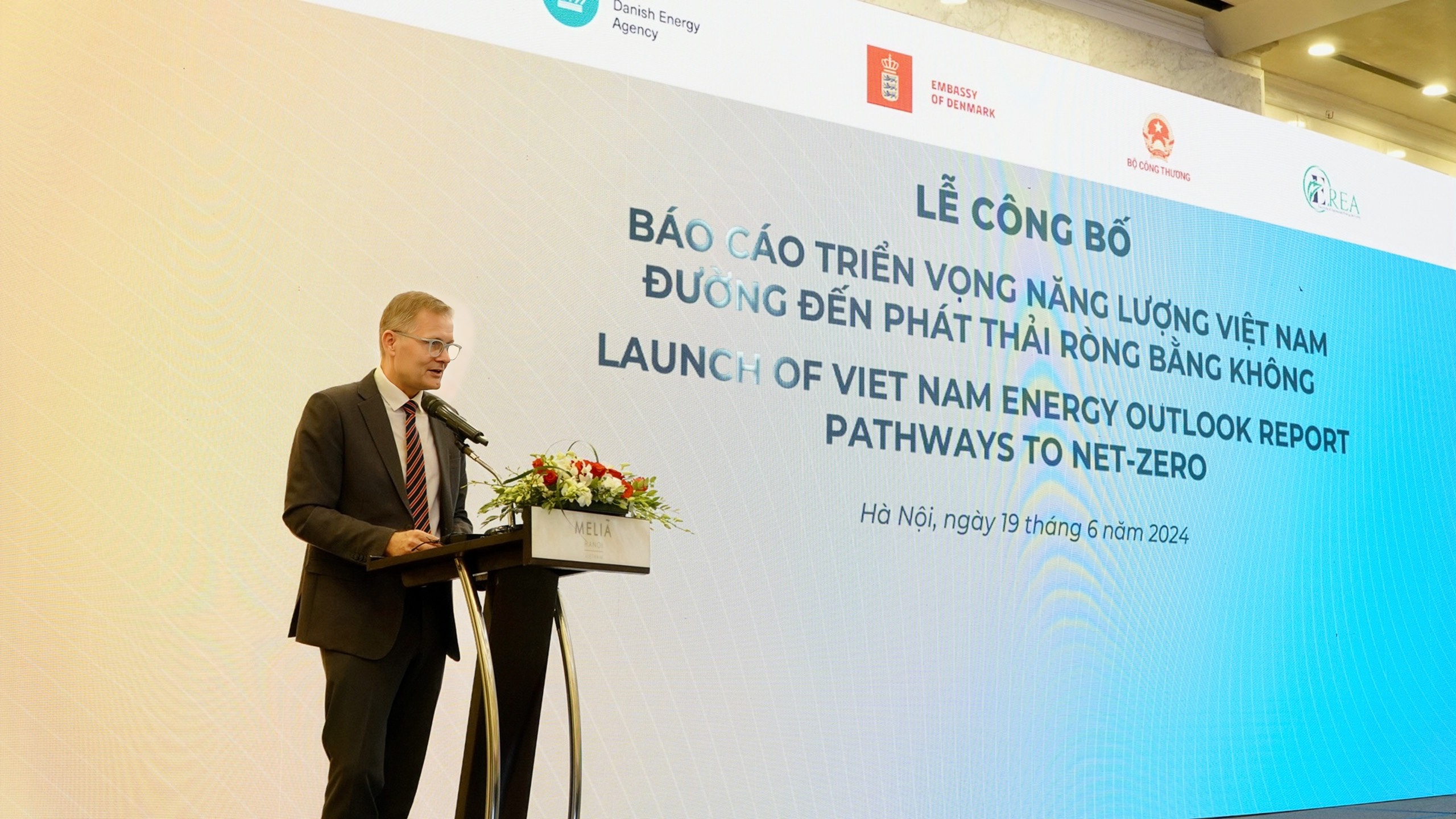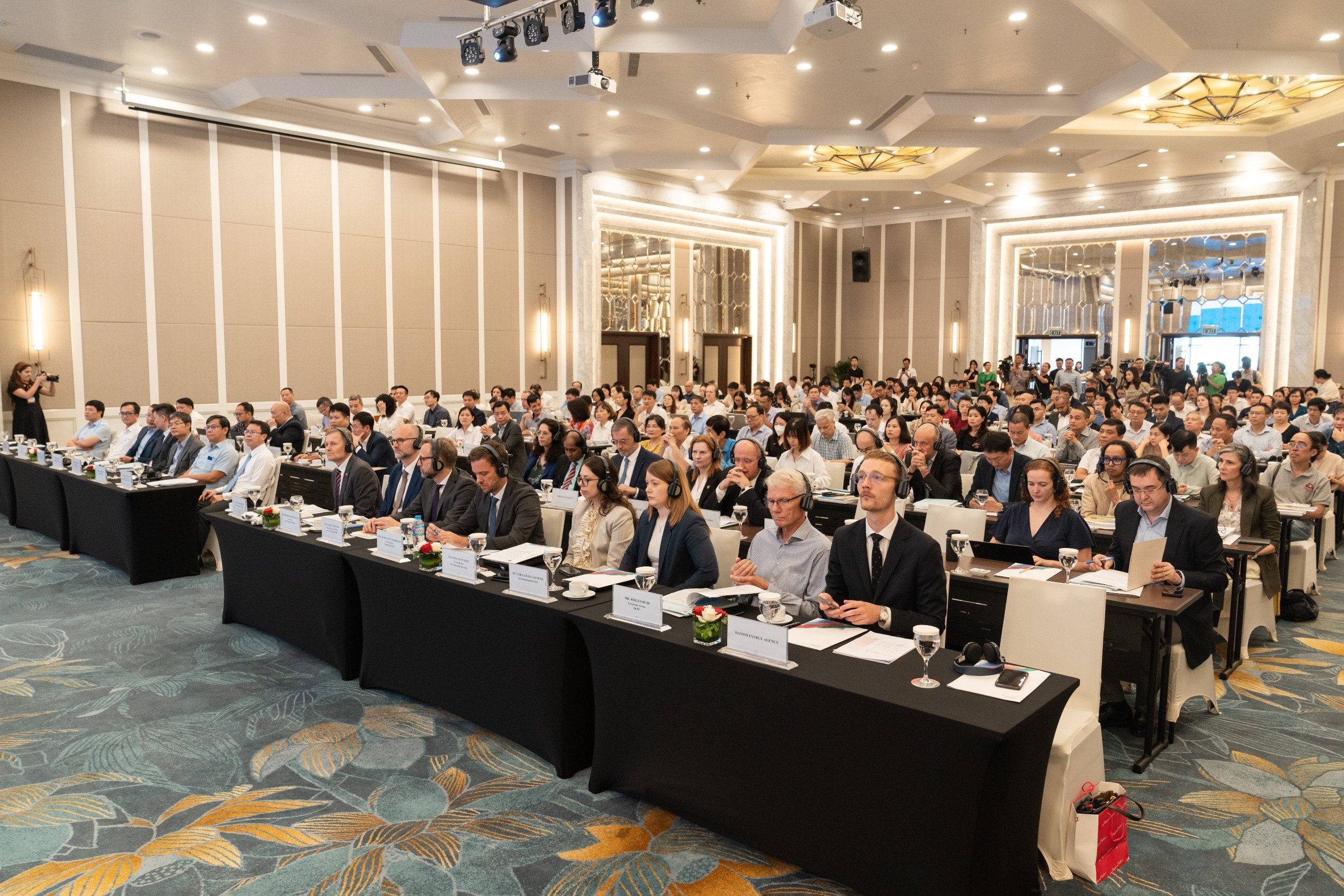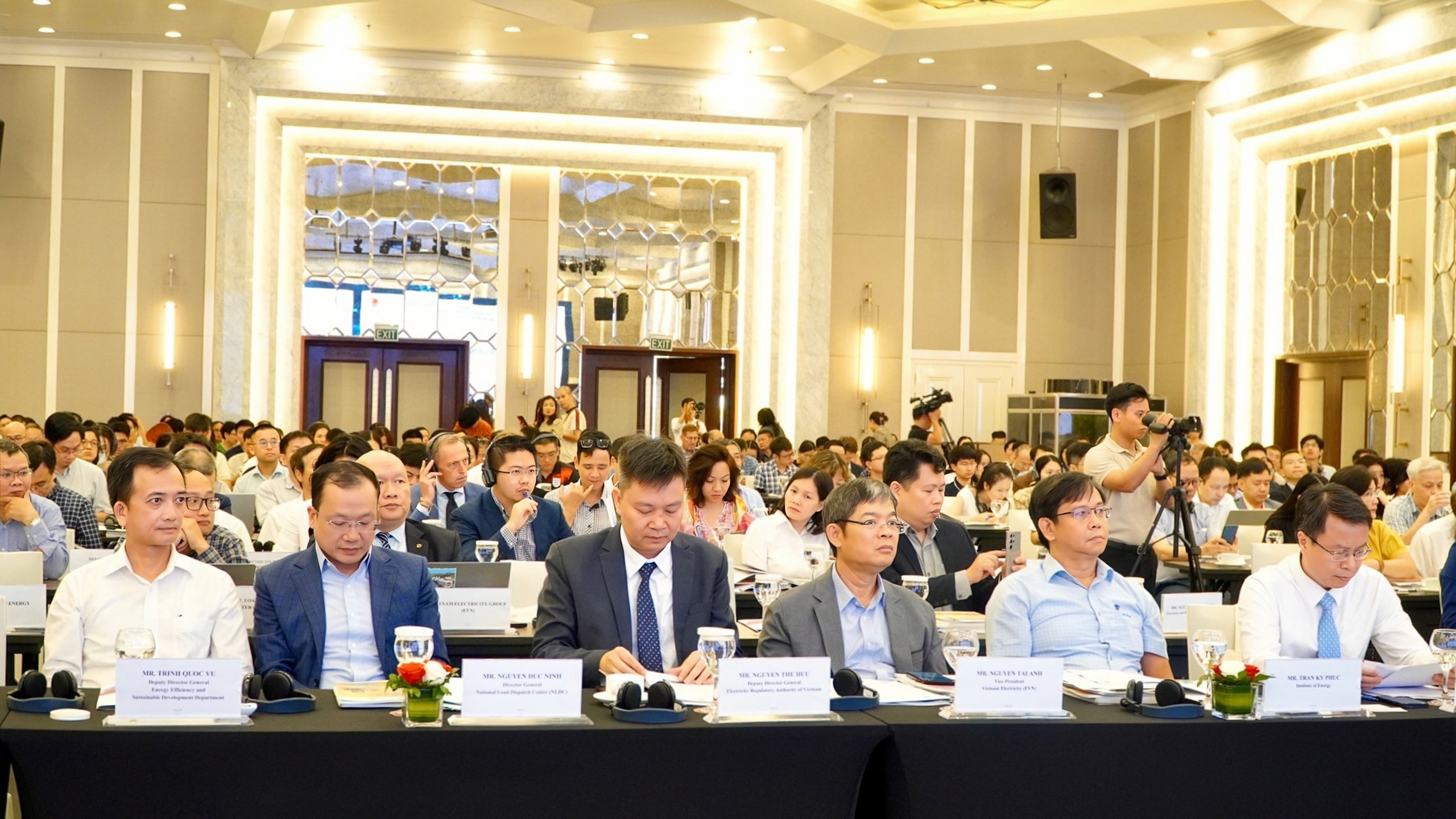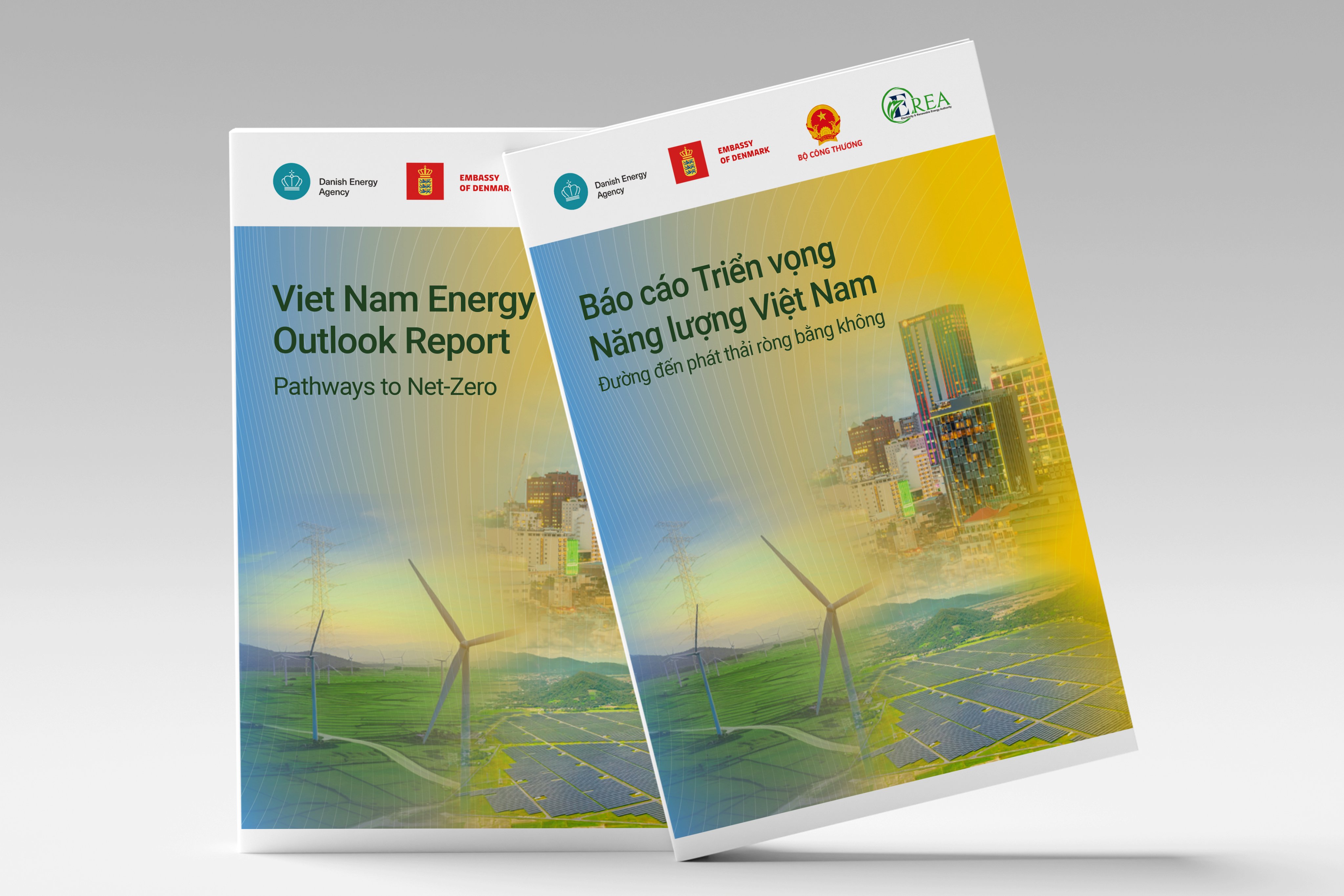The event was attended by representatives from various departments and bureaus of the Ministry of Industry and Trade (Department of Energy Efficiency and Sustainable Development; Electricity and Renewable Energy Authority), representatives from the Danish Energy Agency, the Danish Embassy in Vietnam, representatives from the Vietnam - Denmark Energy Partnership Program (DEPP3), as well as many representatives from ministries, research institutes, universities, energy corporations and associations, and media agencies.
Delegates attending the event.
During the event, Mr. Doan Ngoc Duong, Deputy Director of the Electricity and Renewable Energy Authority, highlighted Vietnam's rapidly growing economy, which has been expanding by 6-7% annually in recent decades. Despite global economic and political instability between 2020 and 2023, Vietnam's economy has shown resilient growth compared to many global economies. Vietnam strives to become a high-income country by 2045, which will significantly increase its energy and electricity demands to support economic and social development.
At the COP26 UN Climate Change Conference in November 2021, Glasgow; Vietnam committed to achieving net-zero emissions by 2050. This commitment reflects the Vietnamese government's determination to transition from traditional fossil fuels to green and clean energy sources, thereby reducing greenhouse gas emissions and against climate change.
Since 2013, the Danish government and Vietnam have signed a long-term cooperation agreement in the energy sector. Past projects and cooperation programs with Denmark have made significant contributions to Vietnam’s energy security and sustainable energy development goals.
In 2017, with technical support from the Danish Energy Agency and under the direction of the Ministry of Industry and Trade, both local and international experts developed and published the Vietnam Energy Outlook Report 2017. This was the first energy outlook report developed and released in Vietnam, providing valuable information and experience in energy development for policymakers.
The Vietnam Energy Outlook Report – Pathway to Net Zero is the fourth publication in the series of Vietnam Energy Outlook Reports developed within the framework of the Vietnam-Denmark Energy Partnership Program. It presents development scenarios for Vietnam's energy system up to 2050, focusing on analyzing practical pathways for Vietnam to achieve its 2050 net-zero emissions commitment.
Following this activity, within the 2017-2020 (DEPP2) and 2020-2025 (DEPP3) phases of the Vietnam-Denmark Energy Partnership Program, the Ministry of Industry and Trade, in collaboration with the Danish Energy Agency, developed and published subsequent editions of the Vietnam Energy Outlook Report, including the reports for 2019, 2021, and the latest edition, Pathway to Net Zero.
The Vietnam Energy Outlook Report – Pathway to Net Zero is the fourth publication in the series of Vietnam Energy Outlook Reports
"Compared to previous publications, the Vietnam Energy Outlook Report – Pathway to Net Zero examines and analyzes energy development scenarios with different input assumptions to study the possibilities of meeting energy needs for socio-economic development under various scenarios in Vietnam. It also promotes the process of transitioning to a green and sustainable energy system, achieving Vietnam’s international commitments in the energy sector and climate change mitigation, and aiming for the net-zero emissions target by 2050 as committed at the COP26 conference and related goals in the National Strategy on Climate Change, National Energy Master Plan for the period 2021-2030, vision to 2050, National Power Development Plan for the period 2021- 2030, vision to 2050", Mr Doan Ngoc Duong stated.

The Danish Ambassador to Vietnam, Mr. Nicolai Prytz, noted that the report serves as a reference for Vietnamese partners in decision-making processes and supports Vietnam in shaping its green energy transition process.
Danish Ambassador to Vietnam Mr. Nicolai Prytz shared: “The Energy Outlook Report – Pathway to Net Zero is an important result of the long-term Energy Partnership between us and Vietnam. This is also a key area of cooperation in the Vietnam - Denmark Green Strategic Partnership. I hope that this report will be a valuable reference source for Vietnamese partners in their decision-making process as well as support Vietnam in shaping its green energy transition. To achieve the net-zero emissions target, Vietnam needs to make rapid, strong, and sustainable efforts. This is not only important in addressing growing energy demand but also helps attract foreign direct investment (FDI) as access to renewable energy becomes increasingly important in investment decisions. private. Denmark is committed to continuing to support Vietnam during this transition process.”

The Department of Energy Efficiency and Sustainable Development heads Phase 3 of the Danish Energy Partnership Program (DEPP3), implemented over five years from 2021 to 2025.
During the event, a panel discussion took place with representatives from Vietnamese policy-making agencies, Danish Ambassador Nicolai Prytz, and the head of the Danish Energy Agency, Mr. Kristoffer Böttzauw. The discussion revolved around the main findings and policy impacts of the report, addressing barriers to expanding investment in green energy, the importance of green economic growth, and the role of state-owned enterprises in the green transition.
The Vietnam - Denmark Energy Partnership Program The Vietnam - Denmark Energy Partnership Program (DEPP) is a collaboration between the Danish Energy Agency and the Vietnam Ministry of Industry and Trade. The first phase of the program, from 2013 to 2017, focused on low-carbon development in industry and buildings; the second phase, from 2017 to 2020, concentrated on energy efficiency and renewable energy integration into the power grid and establishing long-term energy scenario models. The third phase of the Danish Energy Partnership Program (DEPP3) runs from 2021 to 2025. |
Duc Do











